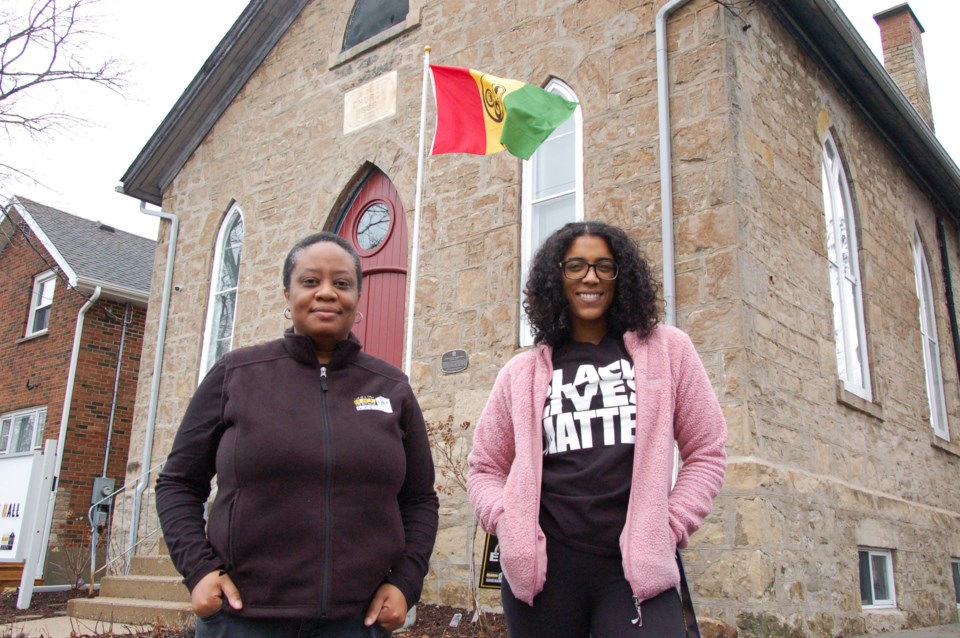A little more than 10 years ago, a group of residents sat at a kitchen table brainstorming ideas about how to save the former Guelph British Methodist Episcopal Church – the only remaining, known Black heritage building in the area.
That dream not only became a reality, but it gave birth to the Guelph Black Heritage Society (GBHS) which strives to increase awareness of historical Black contributions to the city and its social fabric, as well as provide education aimed at eliminating racism and establishing equality.
“We realized that we had to do a little bit more. We had to talk about things of importance to our Black community and we had to make sure that these issues of anti-racism, anti-oppression, that they’re moving forward,” said GBHS president Denise Francis, a founding member of the society.
“These things happen not only across Canada, but Guelph in general too. It’s important that we raise awareness.”
The society has largely achieved its initial goal, which was to buy and preserve the Essex Street church building, now known as Heritage Hall. A roughly $600,000 mortgage remains.
The structure, as explained on the GBHS website, was built in 1880 by previously enslaved Black individuals who arrived in the area via the Underground Railroad, as well as their descendants.
Francis said she grew up in the city but didn’t learn of the building’s history until her time at the University of Guelph.
“When I was growing up, it always seemed to be that Guelph was associated with the Italian community. The Black community actually pre-dated the Italian community,” she said. “When we found out the church was listed for sale, and it’s a fairly good sized lot for Downtown Guelph, we knew that we had to act to do something so it would be there for another 150 years.
“There’s so much about the absence of Black history, so few tangible things that are still in our community that represent our historical community.”
A decade ago this past November, GBHS officially came into being. In December of 2012, it finalized the church’s purchase and soon set out on a fundraising campaign to renovate the building to make it universally accessible – an effort known as the Freedom Project.
The project, which included establishing the Flora Blizzard Francis Memorial Library to honour Black education, was completed and celebrated with a grand opening event last fall.
“When you enter Heritage Hall … it has this presence, this calmness, this grace that you feel when you’re inside,” GBHS executive director Kween said of the hall. “That really felt like a home in a lot of ways for me.”
Even as efforts regarding the hall continued, the past few years have seen the society expand its focus to include raising awareness and acknowledgement of systemic racism, as well as take on lobbying and educational roles.
To that end, the society is involved in education efforts at local schools and participates in community events. It’s also involved with city officials on a number of fronts, including contributing to the creation and ongoing evolution of the Community Plan, which includes goals and actions intended to make Guelph an inclusive community for people of all ages, abilities, cultures and backgrounds.
“For so long, too long, we have been living under the guise of racist policies and practices that have kept … the oppressed oppressed,” said Kween of the need to elevate voices in BIPOC communities.
Kween was one of the key organizers behind the Black Lives Matter solidarity march through Downtown Guelph in the summer of 2020, following the police-related homicides of George Floyd and Breonna Taylor, among others, in the United States.
“We realize the level of attention we got two years ago was not sustainable because people move on to the next cause,” said Francis. “We want people to understand issues that are affecting the Black community also affect other racialized communities too.”
Despite gains made, there remains a long way to go.
A recent survey conducted on behalf of Guelph-Wellington Local Immigration Partnership found that approximately nine out of 10 local Indigenous peoples, and about seven out of 10 immigrants and BIPOC residents reported experiencing discrimination during the past three years.
“We need to do more to support and amplify the voices of our community,” said Francis. “We want to see a better understanding. We’re proud of who we are and we want to share our culture.
“We’re never going to eliminate racism, but if (people) just understand the issues in our community, then we would have accomplished our goal.”
GBHS’ 10 anniversary passed last fall with little fanfare, in part due to pandemic-related restrictions, Kween explained. However, with restrictions easing, the society has a number of events and activities planned throughout 2022, including hosting an anti-racism summit May 12 to 15.
“We were in such different times back in November. It was so hard around COVID,” she said.
For more information about Guelph Black Heritage Society, including its events and volunteer opportunities, visit www.guelphblackheritage.ca.
